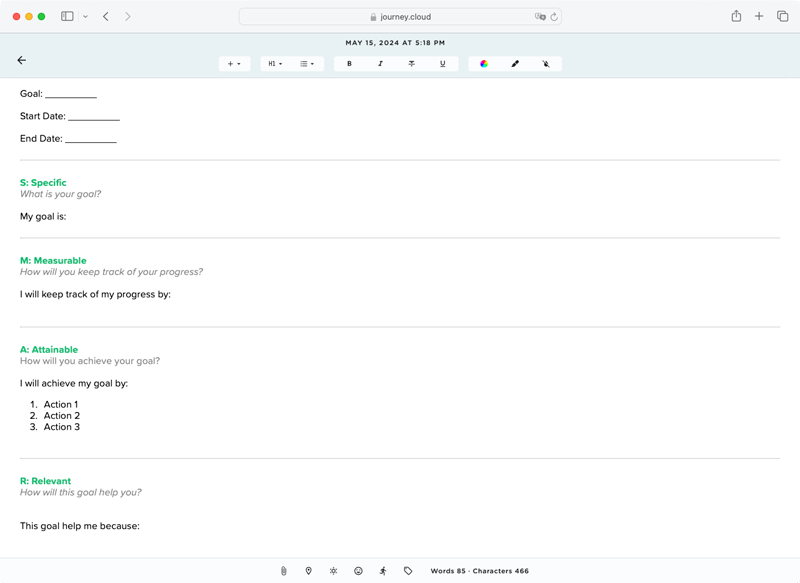How to Use a Journal to Keep Your SMART Goals on Track
Unlock your potential by combining SMART goals with daily journaling. Stay organized, focused, and motivated on your path to success. Ready to transform your aspirations into achievements? Dive into our blog to discover practical tips and start journaling today.

In our busy lives, it can be hard to focus on what we want to achieve. Whether it's getting better at work, improving ourselves, or staying healthy, having a clear plan helps a lot. That's why SMART goals and daily journaling are so useful. These tools can guide you toward success, helping you not just set goals, but actually reach them.
In our busy lives, it can be hard to focus on what we want to achieve. Whether it's getting better at work, improving ourselves, or staying healthy, having a clear plan helps a lot. That's why SMART goals and daily journaling are so useful. These tools can guide you toward success, helping you not just set goals, but actually reach them.
This article will show you how writing in a journal every day can help you stay on track with your SMART goals. We'll look at why SMART goals are good, how journaling helps you achieve your goals, and easy ways to start journaling every day. By the end, you'll know how to turn your dreams into reality with daily journaling.
Understanding SMART Goals
Photo by Ronnie Overgoor / Unsplash
Before diving into journaling techniques, it’s crucial to understand what SMART goals are and why they are effective. SMART is an acronym that stands for Specific, Measurable, Achievable, Relevant, and Time-Bound. Here's a breakdown of each component:
Specific
Clearly define what you aim to achieve. A specific goal answers the questions: What do I want to accomplish? Why is this goal important? Who is involved?
Example: Rather than setting a vague goal like “get fit,” a specific goal would be “lose 10 pounds in 3 months by exercising three times a week and eating a balanced diet.”
Measurable
Determine how you will measure progress and know when the goal is achieved. This could be in the form of milestones or specific indicators.
Example: Tracking weight loss every week, measuring the number of workouts completed, or logging daily calorie intake.
Achievable
Set goals that are realistic and attainable given your current resources and constraints. It should stretch your abilities but remain possible.
Example: Setting a goal to run a marathon next month might not be achievable if you’ve never run before, whereas aiming to run a 5K in two months could be.
Relevant
Align your goals with your broader objectives and ensure they are worthwhile and meaningful. This ensures that your goals are not only important to you but also align with other objectives in your life.
Example: If your broader objective is to improve overall health, a relevant goal would be to incorporate more fruits and vegetables into your diet.
Time-Bound
Set deadlines for your goals to create a sense of urgency and keep you focused.
Example: Instead of saying “I will lose weight,” a time-bound goal would be “I will lose 10 pounds in 3 months.”
5 Benefits of SMART Goals Method
Setting goals is a fundamental component in the roadmap to success. However, not just any goal can lead to success; the goals need to be well-structured and thoughtfully planned. That's where SMART goals come into play. The SMART framework refines goals through specific criteria, making them Specific, Measurable, Achievable, Relevant, and Time-bound. The adoption of SMART goals offers several benefits that can enhance your personal and professional life.
When setting goals, specificity and structure can dramatically influence your ability to achieve them. This is where SMART goals—Specific, Measurable, Achievable, Relevant, and Time-bound—shine. Unlike vague or poorly defined goals, SMART goals offer a host of advantages that can propel you toward success. Here’s a closer look at how they can benefit you:
1. Increased Focus and Clarity
Photo by Paul Skorupskas / Unsplash
One of the biggest advantages of SMART goals lies in their specificity. They clearly outline exactly what you want to achieve, leaving no room for ambiguity. This precise roadmap helps you direct your energy and resources into what truly matters, rather than scattering your efforts aimlessly.
When you know exactly what you’re aiming for, it becomes easier to identify which tasks and activities will get you there. This focused approach minimizes distractions and ensures that you are consistently working on high-impact tasks.
2. Improved Motivation
A well-defined SMART goal doesn’t feel like a pipe dream; it feels like something within your reach. This sense of attainability can significantly boost your motivation. When a goal feels realistic, you are more likely to stay engaged and committed to the process.
The specific nature of SMART goals makes it easier to see the end point, keeping you engaged throughout the journey. With each milestone achieved, you get a jolt of motivation that pushes you further toward your ultimate objective.
3. Measurable Progress
Photo by Volodymyr Hryshchenko / Unsplash
One of the key aspects of SMART goals is that they are measurable. Having measurable criteria allows you to track your progress, providing you with a visual representation of how far you’ve come and how far you still have to go.
Achieving milestones along the way gives you an opportunity to celebrate small wins. These celebrations act as positive reinforcement, keeping your motivation levels high and encouraging you to continue pushing forward.
Because SMART goals are measurable, they provide a natural feedback loop. This allows you to identify areas where you might be lagging and make real-time adjustments to get back on track.
4. Enhanced Achievability
SMART goals are designed to be achievable. Setting realistic targets ensures you won’t feel overwhelmed or discouraged. When you conquer smaller, manageable goals, you build confidence and lay the groundwork for bigger achievements.
Breaking down a large goal into smaller, attainable parts reduces the stress and anxiety often associated with goal-setting. This incremental approach makes the process less daunting and more manageable.
5. Better Time Management
One of the cornerstones of SMART goals is that they have a defined timeframe. Deadlines create a sense of urgency and help you prioritize tasks effectively. A clear timeline ensures you stay on track and don’t procrastinate.
With a clear end date in sight, you’re compelled to manage your time more efficiently. This prioritization translates into improved productivity and ultimately, faster achievement of your goals.
Planning SMART Goal Using a Journal Template
Setting SMART goals is a proven method for achieving success, and using a journal app can make the process even more effective and manageable. Journey’s SMART goal template provides a structured framework to ensure your goals are not just well-defined but also achievable and relevant within a specific timeframe.

Here’s a detailed look at how this template can help you achieve your goals:
S: Specific
Start date: 1 Jan 2024
End date: 20 June 2025
What is your goal?
My goal is:
The template’s initial prompt encourages you to be specific about what you want to accomplish. Instead of vague statements like "I want to be healthier," the template guides you to more specific goals, such as "I want to lose 10 pounds." This specificity eliminates ambiguity and helps you understand exactly what you're working toward.
M: Measurable
How will you keep track of your progress?
I will keep track of my progress by:
This section is crucial for converting your abstract goal into quantifiable milestones. You might note that you’ll track your weight loss weekly using a scale, or log your meals and workouts in the app. The key is to set measurable indicators that can offer concrete evidence of progress, helping you stay motivated and focused.
A: Attainable
How will you achieve your goal?
I will achieve my goal by:
• action 1
• action 2
• action 3
This part of the template asks you to brainstorm the specific actions you'll take to reach your goal. If your aim is to lose weight, your actions might include committing to a diet plan, exercising five times a week, and getting at least seven hours of sleep each night. Listing these actions clarifies the steps you need to take and makes your goal seem more attainable.
R: Relevant
How will this goal help you?
This goal helps me because:
This section prompts you to reflect on the importance of your goal and its alignment with your broader life objectives or values. For instance, you might write, "Losing weight will improve my overall health and increase my energy levels, allowing me to be more active with my family." Understanding the relevance of your goal adds emotional investment and ensures that you're motivated by more than just the end result.
T: Timely
When will you achieve this goal?
I will complete this goal by:
Setting a deadline instills a sense of urgency and helps in planning the steps you need to take each day, week, and month. Perhaps you decide that you aim to lose 10 pounds in three months. This timeframe allows you to pace yourself and make steady progress without feeling overwhelmed.
An Example of SMART Goal
Utilizing Journey’s SMART goal template organizes these elements in a clear, straightforward manner. Here’s how a completed template might look for someone aiming to lose weight:
Goal: Lose 10 pounds.
Start Date: October 1, 2024
End Date: January 1, 2025
S: Specific
My goal is:
Lose 10 pounds by following a structured diet and exercise plan.
M: Measurable
I will keep track of my progress by:
Weighing myself every week, logging meals, and keeping an exercise diary within the app.
A: Attainable
I will achieve my goal by:
• Following a balanced diet plan.
• Exercising five times a week (mix of cardio and strength training).
• Getting at least seven hours of sleep each night.
R: Relevant
This goal helps me because:
It will improve my overall health, increase my energy levels, and allow me to be more active with my family.
T: Timely
I will complete this goal by:
January 1, 2025.
By filling in each section of the template, you create a detailed and actionable plan that lays the groundwork for success. A SMART goal diary template not only helps you define and organize your objectives but also builds in accountability, encouraging you to track your progress and make necessary adjustments along the way. This structured approach transforms your aspirations into tangible milestones and, ultimately, into achieved goals.
Using a journal to keep track of your SMART goals can greatly improve your chances of success. By writing down your goals, tracking your progress, and reflecting on your achievements, you stay focused and motivated. Remember to keep your goals Specific, Measurable, Achievable, Relevant, and Time-bound. With regular journaling, you'll find it easier to stay on the path to reaching your dreams. Make journaling a daily habit, and watch as it helps you turn your goals into achievements.






